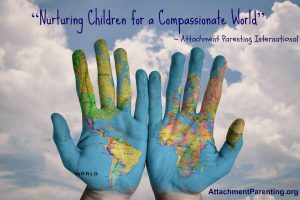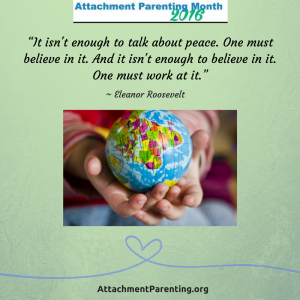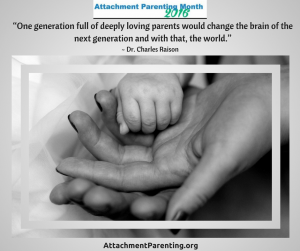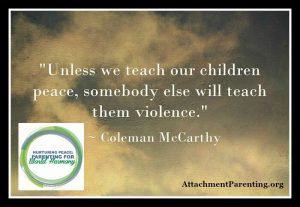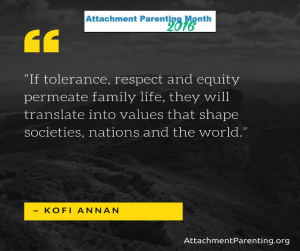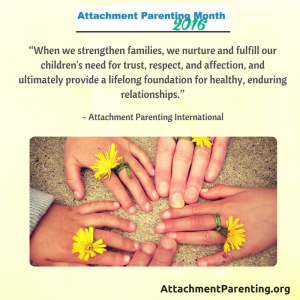Category: Respond with Sensitivity
It isn’t enough to talk about peace…
How different the world could be
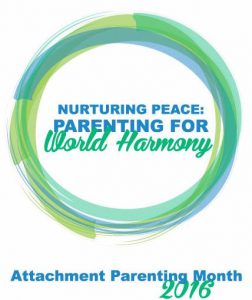 Editor’s Note: This post was originally published on 12/4/2015. As we continue to celebrate AP Month with this year’s theme, “Nurturing Peace: Parenting for World Harmony,” this article highlights the significance and magnitude of the choices we hold as parents — in the face of darkness, we can choose light and peace for our children and, with that, change the world.
Editor’s Note: This post was originally published on 12/4/2015. As we continue to celebrate AP Month with this year’s theme, “Nurturing Peace: Parenting for World Harmony,” this article highlights the significance and magnitude of the choices we hold as parents — in the face of darkness, we can choose light and peace for our children and, with that, change the world.
~~~~~~~~~~
“We’ve all got both light and dark inside of us. What matters is the part we choose to act on. That’s who we really are.”
~ J.K. Rowling in her book, Harry Potter and the Order of the Phoenix
San Bernardino, Paris, Chattanooga, Tunisia, Fort Hood, Lafayette, Kuwait, Colorado Springs — this short list is just a fraction of the mass shootings and terrorist activities that have occurred this year in the United States and around the world, not to mention the last few years. It is mind boggling, heart breaking and troubling to me as a parent whose goal is to raise compassionate, peaceful children. How am I suppose to do that exactly?
I try to shield my children from media splashed with coverage of these horrific events, but they hear about it anyway from conversations at school, church or the grocery store. Their school holds drills to practice in the case of a shooter. Our church prays for peace. We hear glimpses of the attacks on the radio in between songs. My daughters ask me why people are violent toward other people. My son asks me where the bad guys in the world live, so he can avoid living there when he grows up.
 I want to retain their deep compassion for people, even those who seem impossible to understand or love, so I talk about how there there are no “bad guys.”
I want to retain their deep compassion for people, even those who seem impossible to understand or love, so I talk about how there there are no “bad guys.”
We all have the choice to make good or bad decisions, and the people who do these violent acts are making choices not based on love and compassion. These people may have grown up learning poor coping skills, or they may feel lost and confused and unloved themselves, or they may be involved with a group whose beliefs are very different than ours in how we live together and resolve conflict. It doesn’t make them “bad,” though they have definitely made poor choices.
But I struggle with that reasoning inside. It’s so easy, so natural, for humans to blame. It helps us make sense of the senseless, to find closure in hard situations. I want to blame something other than “poor coping skills.” But I also know that blaming a person or a society or religious beliefs wouldn’t satisfy me, either. I have found, through my own experience, that blame can be used to keep a person from seeing the big picture. When we blame, we are reclassifying a person or belief as “bad” — in our minds — and therefore someone or something that is outside of our need to feel compassion for. We can then more easily justify our anger.
To clarify, anger isn’t “bad.” Anger can be very useful in that we know what needs to be addressed in a relationship, what crosses that boundary in our personal comfort level. But it is very possible, with unchecked anger, to be destructive toward ourselves and others. It’s an important skill to learn ourselves and teach our children to manage anger so that our thoughts, words and actions are constructive and helpful in resolution. We turn the anger — and “need” to blame — that we feel toward perpetrators of these violent incidents into a desire to find real solutions, to comfort those who grieve, to rally with others in movements toward peace.
So, it’s not enough for me — as a parent — to explain to my children that some people just make poor life choices. I want to gather with others to find ways to prevent these acts of violence. And that looks different to different people, but for me, I think all the more of API. As cliche as it may sound, I truly feel that world peace is attainable, and I feel that parenting is a major key in preventing violence.
 According to API Advisory Board member Sir Richard Bowlby, Bt, his father — the late John Bowlby, the father of Attachment Theory — had said that “attachment” is the scientific word for “love.”
According to API Advisory Board member Sir Richard Bowlby, Bt, his father — the late John Bowlby, the father of Attachment Theory — had said that “attachment” is the scientific word for “love.”
Peace and joy are inherent in real love, and what is more pure than that? API is all about supporting parents worldwide in parenting with love, which is the most basic definition of Attachment Parenting. And if all children had the opportunity to grow up in a home focused entirely on love and peace, how different the world could be.
In reference to the Harry Potter quote above, I choose the light.
**Small photo (above) of Richard, as a toddler, playing with his father, Dr. John Bowlby, the researcher who developed Attachment Theory
*Large stock photo source
One generation full of deeply loving parents
Unless we teach our children…
Modeling empathy to promote peace
 I believe empathy is one of the most important aspects in promoting peace. Children who are taught to be empathetic and who witness empathy will, in turn, show more empathy to others.
I believe empathy is one of the most important aspects in promoting peace. Children who are taught to be empathetic and who witness empathy will, in turn, show more empathy to others.
I attempt to teach empathy to my children through positive discipline, responding sensitively to their needs and emotions, and being present for them. I do my best to create a safe space for their emotions and to be a model of peaceful interactions with others.
Nowadays in my family, modeling empathy often occurs when helping my 4-year-old son wait while his sister has the toy he wants. I empathize with his emotions of frustration while also explaining that she would be sad if he took the toy from her.
When my 2-year-old daughter pouts, “I wasn’t ready to go to bed,” I choose to show her compassion. I acknowledge that she’s sad and say something like, “I know it’s hard to stop playing and go to bed, especially when your brothers are still awake, but now it’s time for us to cuddle together, and I’ll sing to you.”
With my 6-year-old son, we talk about how his strong emotions like anger are OK but that we need to work together to find appropriate outlets for those feelings.
 Being sensitive to my children’s emotions works in helping them have more peaceful interactions with others. When my oldest son was 2, I remember hearing him putting his stuffed animals to sleep, speaking very gently to them and being present with them as I was with him. Now, at age 6, I see him express concerns for others when they get injured. Even my youngest child, only 2, will ask if I’m OK when I get hurt.
Being sensitive to my children’s emotions works in helping them have more peaceful interactions with others. When my oldest son was 2, I remember hearing him putting his stuffed animals to sleep, speaking very gently to them and being present with them as I was with him. Now, at age 6, I see him express concerns for others when they get injured. Even my youngest child, only 2, will ask if I’m OK when I get hurt.
For my children today, opportunities for empathy happen most often in interactions with classmates, neighbors, and each other. But someday when they’re grown, I believe it will translate into their relationships with coworkers, spouses, their own children, and others they encounter in their lives. This is how practicing Attachment Parenting and being sensitive, responsive, and empathetic to our children can help create peace outside of the family and in the greater community.

